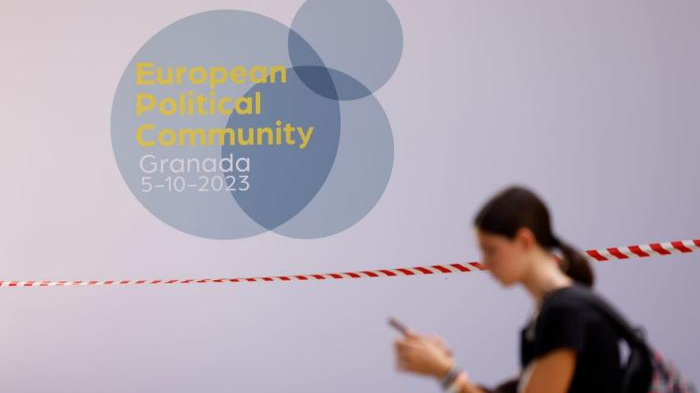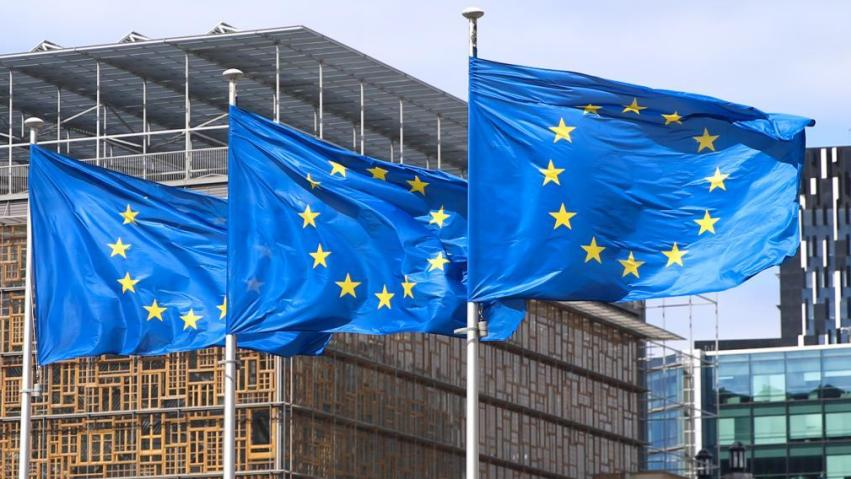
A woman holds a smart phone in front of a European Political Community meeting logo in Granada, Spain, October 4, 2023. /AFP
A woman holds a smart phone in front of a European Political Community meeting logo in Granada, Spain, October 4, 2023. /AFP
Editor's note: Dong Yifan, a special commentator for CGTN, is a research fellow with the Institute of European Studies, at the China Institutes of Contemporary International Relations. The article reflects the author's opinions and not necessarily the views of CGTN.
The third European Political Community Summit kicks off today (October 5) in Granada, Spain. The heads of 27 EU member states and leaders of 20 neighboring countries, including the United Kingdom, Ukraine, Moldova, Türkiye and so on are participating in the summit. This summit is being held only four months after the Moldova Summit in June. French President Emmanuel Macron proposed the establishment of this high-level meeting in May 2022, and now this pan-European consultation and cooperation mechanism is moving forward.
The idea of a European Political Community reflects France's thinking on the European political and security landscape, which is through a mechanism that can link all countries in the pan-European region to jointly promote European unity and seek to control Europe's destiny. These initiatives coincide with the original intention of the establishment and development of the EU. They are also regarded by the EU as a dialogue and exchange framework that deepens the appeal of its values and ideas, and ultimately guides neighboring countries onto the path that Brussels wants. From the current point of view, the European Political Community has received a widespread response from the EU and its surrounding countries. The number of participating countries has increased from 44 at the Prague Summit in October 2022 to 47 now. At the same time, two summits are held every year, and the EU rotating presidency and non-EU countries take turns hosting the conference. It can be said that the European Political Community has continued to take solid steps from conception to practice.
Judging from the main concerns of all participating parties, the core issue of the European Political Community is still the issue of "identity." On the one hand, non-EU countries represented by Ukraine, Moldova and the Western Balkan countries hope to get "brownie points" to join the EU by participating in the European Political Community and move closer to the EU in a gradual manner. From the perspective of the EU and its member states, the European Political Community provides neighboring countries with a political vision or "another option" when they cannot immediately fulfill their EU membership commitments, that is, through continuous dialogue and cooperation. It promotes mutual trust and identity, and then continues to release the EU's soft power in systems, values and concepts.

Flags of the European Union. /Xinhua
Flags of the European Union. /Xinhua
In fact, two major countries, Germany and France, recently issued an influential policy report on the issue of European integration, which mentioned the vision of a "multi-layered EU," which means that European countries can be divided into EU countries based on differences in their degree of integration. There are roughly four categories: core countries, general countries, EU candidate countries and European Political Community. The European Political Community members are the most peripheral and loosest members of European regional cooperation. Among them are countries that hope to gradually join the EU and some that hope to cooperate with the EU in the future – countries that cooperate closely in various fields while maintaining an appropriate distance; but these countries all want to have the label and identity of "Europe."
However, the European Political Community has difficulty satisfying all parties on the issue of "identity." For non-EU member states, becoming a member of the European Political Community does not mean that the threshold or process for joining the EU has been simplified. The gap between ideals and reality is still huge. At the same time, these countries are not willing to be forced by the EU accession process to become a political tool of the EU. Within the EU, there is also great controversy over the European Political Community.
Central and Eastern European countries generally believe that the European Political Community is a delaying measure by Western European countries to delay the accession of Ukraine, Moldova and other countries to the EU, and they are very wary of France's promotion of "Europeanism" by the use of the European Political Community. The platform strengthens the role of France and Germany as major powers, while Western European countries are worried that the European Political Community will become an accelerator for the EU's eastward expansion. When the EU is already mired in multiple crises, greater economic and political challenges will arise due to absorbing new members.
In addition, the different positions of the various participants in the European Political Community on the agenda will also affect its development. Taking this Granada summit as an example, the host country Spain hopes to make artificial intelligence, the Ukraine crisis and the mobility of university graduates the key agenda items of the meeting, while the UK hopes to make dealing with illegal immigration a key agenda due to the influence of domestic political factors.
As a result, Spain and the United Kingdom have experienced diplomatic tensions, while Ukraine may well hope to use the European Political Community to further create an atmosphere of isolation and hostility to Russia. The recent disputes between Armenia and Azerbaijan may also cause a diversion from the agenda. From this point of view, the divergence of positions among countries is likely to turn the European Political Community into a forum for countries to discuss controversial issues, making it difficult to promote substantive cooperation in promoting peace and development in Europe.
(If you want to contribute and have specific expertise, please contact us at opinions@cgtn.com. Follow @thouse_opinions on Twitter to discover the latest commentaries in the CGTN Opinion Section.)